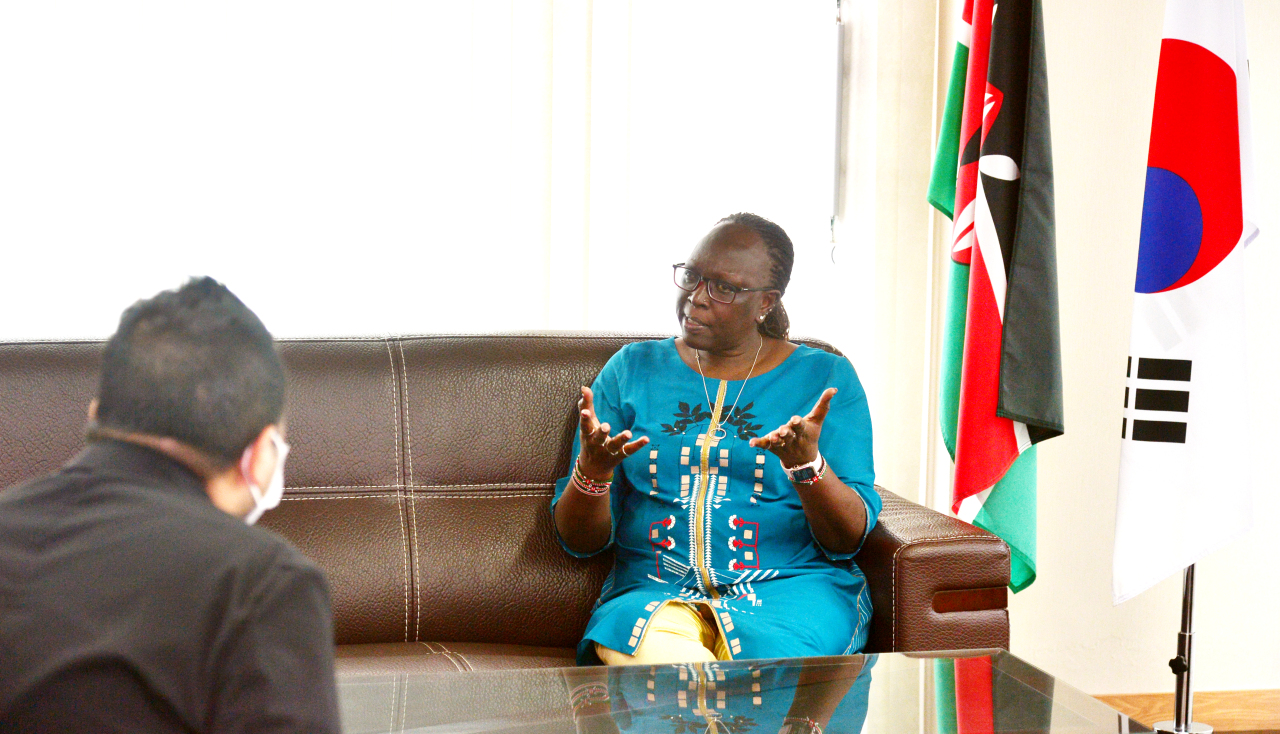[Diplomatic Circuit] Kenya is gateway to African market: cabinet secretary
By Sanjay KumarPublished : July 20, 2021 - 12:34

Korean companies will archive market access through regional integration in Africa and East African region if Kenya is made base, according to Betty Maina, Kenya’s cabinet secretary for industrialization, trade and enterprise development.
“Setting up Kenya as base will access 50 million Kenyan people, 500 million people in the Common Market for Eastern and Southern Africa (COMESA) and a billion people in the whole of Africa,” Maina said.
“Kenya has a market-based economy with membership of other regional intergovernmental blocks such as the East African Community, COMESA, the African Continental Free Trade Area (AfCFTA) and a lot of freedom and potential that will prosper Korean businesses.”
She encouraged Korean companies to invest in the Big 4 Agenda of Kenya – food security, affordable housing, manufacturing and affordable health care.
This comes alongside Kenya’s Vision 2030, a sustainable development blueprint to transform Kenya into a globally competitive, newly industrialized, middle-income country.
Maina said that the Kenyan government creates a framework, but investments in manufacturing, agriculture, housing or even in universal health care rely on private investment.
Maina expressed hope to improve trade balance in bilateral relations and market access of Kenya’s high-quality agro products in Korea.
According to Maina, the current trade deficit is in favor of Korea and hence, Kenya aspires to fast track processes for approval, regulatory checks and controls on its exports.
“The trade regulations around the world are fairly strict and they may not be mountable in some cases, however, since it’s a global issue with Korea and other countries, it is necessary to deal with protectionism and facilitate agro trade ensuring partners to continue business,” she said.
Maina said that balanced trade would be in the interest both countries, however, she did not comment on specific ways to minimize the current trade deficit.
She said Kenya was ready to facilitate Korean industries to expand businesses in pharmaceuticals, cosmetics, automotive and electronic manufacturing.
Maina visited Korea as part of a delegation to Coffee Expo Seoul 2021. Kenya has been selected as the expo’s “guest focus country.”
Maina emphasized the consumption of Kenyan coffee in South Korea, and indicated the need of more marketing in South Korea to keep Kenyan coffee exports to South Korea steady.
According to the Kenya Export Promotion and Branding Agency, South Korea imports 146,000 metric tons of coffee from Kenya. Coffee is Kenya’s main export to South Korea and Korea ranks fourth in terms of consumption of Kenyan coffee. Kenyan coffee attracts low tariffs of 8 percent as compared to tea which attracts a 40 percent tariff.
Asked what opportunities there were in the post-COVID world, she said, “There will be life after COVID-19 and fostering Kenya-Korea private investment will strengthen global supply chains.
“COVID-19 has taught us not to only rely on particular source markets, an important learning for Korean industries to diversify source markets so that Korea can get best coffee directly from Kenya not necessarily through other indirect sources -- a room for addition and strong emergence.”
The cabinet minister also sees Kenya as a potential tourism market, which will promote culture and strengthen people-to-people contacts.
“Korean tourists go all over the world. Coffee is a start but we will explore possibilities of African tourism, particularly Kenyan tourism,” she hoped.



















![[Today’s K-pop] Treasure to publish magazine for debut anniversary](http://res.heraldm.com/phpwas/restmb_idxmake.php?idx=642&simg=/content/image/2024/07/26/20240726050551_0.jpg&u=)